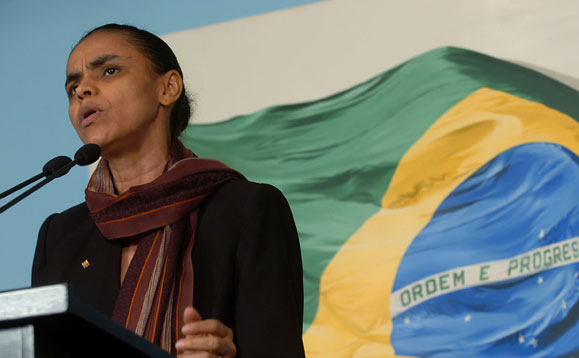(THIS ARTICLE IS MACHINE TRANSLATED by Google from Norwegian)
Wednesday 1. April, it was announced that Brazil's former Minister of Environment, Marina Silva, will be awarded this year Sophie Price for their work in securing the Amazon rainforest. The Price of 100 The 000 US Dollar was created by Jostein Gaarder and Siri Dannevig in 1997, and goes to individuals and organizations who "have pioneered alternatives to today's development and / or implemented various alternatives".
- Congratulations on the Sofie award! What does this mean for your work?
- First and foremost, this gives strength. This is positive because it makes the fight for the Amazon more visible.
- When did you decide to fight for the Amazon?
- I was born in the rainforest, and lived there until I was 15 years old. My family was rubber taps, and since I was a child I have always had close contact with nature and the people who live there. When I started studying, my political commitment became clear to me. But in practice I had this with me from childhood.
- What is the biggest challenge today?
It is important to combine growth with protection. It is important that you have a system for valuing the rainforest, diversity and knowledge of the local people there. This requires a model that allows one to use the many other opportunities the forest offers beyond harvesting, such as tourism and technological development.
- Last week, Norway and Brazil signed an agreement that secures the Brazilian rainforest fund around 700 billion Norwegian kroner. Does this make a difference?
- Yes, Norway's gesture has been very important to get through the national plan against climate change and deforestation in Brazil. Deforestation decreased by 57 per cent in the period 2005 – 2007, and we negotiated this fund with Norway to expand our efforts. I was Minister of the Environment when these negotiations were launched.
- You chose to resign as Minister of the Environment in May last year. Why?
- I noticed that I no longer had the political support needed to stick to environmental policy. Towards the end of 2007, we noticed that deforestation was on its way up again. Therefore, we initiated strong countermeasures, including criminalizing all activity related to illegal timber, including the purchase and transport of this. This led to strong pressure, and I noticed that the opponents would probably win. I think my resignation contributed to the measures still going through, because the case received a lot of attention both nationally and internationally. The government eventually bowed to pressure from public opinion.
- Are you still optimistic?
- My will to fight is the same today. I think we must first and foremost have the courage, whether we are optimistic or pessimistic. This is not just about our needs right now, but about things we need to do today, knowing that those who want to enjoy it the most have not yet been born.
- In many countries, there is great commitment to the Amazon. What do you think about the pressure from outside?
- There are two ways to care: one good and one bad. It is positive if you provide resources and technology to help the countries that have control over the Amazon. But what is negative is if one does not believe that these countries are competent enough to protect this resource. Just as it is difficult for industrialized countries to move from fossil fuels to renewable energy, it is difficult for developing countries to move away from deforestation. They need support, and here Norway comes in as an example, by strengthening the efforts Brazil is already making, and at the same time respecting the country's right to rule.
Also read: The battle for the rainforest (The Borneo Case)


